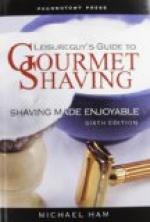But Ruth was not laughing.
It was a cloudy day and Jed’s living-room was almost dark when Ruth entered it. Jed, who had been sitting by the desk, rose when she came in.
“Land sakes, Ruth,” he exclaimed, “it’s you, ain’t it? Let me light a lamp. I was settin’ here in the dark like a . . . like a hen gone to roost. . . . Eh? Why, it’s ’most supper ’time, ain’t it? Didn’t realize ’twas so late. I’ll have a light for you in a jiffy.”
He was on his way to the kitchen, but she stopped him.
“No,” she said quickly. “Don’t get a light. I’d rather not, please. And sit down again, Jed; just as you were. There, by the desk; that’s it. You see,” she added, “I—I—well, I have something to tell you, and—and I can tell it better in the dark, I think.”
Jed looked at her in surprise. He could not see her face plainly, but she seemed oddly confused and embarrassed.
“Sho!” he drawled. “Well, I’m sure I ain’t anxious about the light, myself. You know, I’ve always had a feelin’ that the dark was more becomin’ to my style of beauty. Take me about twelve o’clock in a foggy night, in a cellar, with the lamp out, and I look pretty nigh handsome—to a blind man. . . . Um-hm.”
She made no comment on this confession. Jed, after waiting an instant for her to speak, ventured a reminder.
“Don’t mind my talkin’ foolishness,” he said, apologetically. “I’m feelin’ a little more like myself than I have for—for a week or so, and when I feel that way I’m bound to be foolish. Just gettin’ back to nature, as the magazine folks tell about, I cal’late ’tis.”
She leaned forward and laid a hand on his sleeve.
“Don’t!” she begged. “Don’t talk about yourself in that way, Jed. When I think what a friend you have been to me and mine I—I can’t bear to hear you say such things. I have never thanked you for what you did to save my brother when you thought he had gone wrong again. I can’t thank you now—I can’t.”
Her voice broke. Jed twisted in his seat.
“Now—now, Ruth,” he pleaded, “do let’s forget that. I’ve made a fool of myself a good many times in my life—more gettin’ back to nature, you see—but I hope I never made myself out quite such a blitherin’ numbskull as I did that time. Don’t talk about it, don’t. I ain’t exactly what you’d call proud of it.”
“But I am. And so is Charlie. But I won’t talk of it if you prefer I shouldn’t. . . . Jed—” she hesitated, faltered, and then began again: “Jed,” she said, “I told you when I came in that I had something to tell you. I have. I have told no one else, not even Charlie, because he went away before I was—quite sure. But now I am going to tell you because ever since I came here you have been my father confessor, so to speak. You realize that, don’t you?”
Jed rubbed his chin.
“W-e-e-ll,” he observed, with great deliberation, “I don’t know’s I’d go as far as to say that. Babbie and I’ve agreed that I’m her back-step-uncle, but that’s as nigh relation as I’ve ever dast figure I was to the family.”




